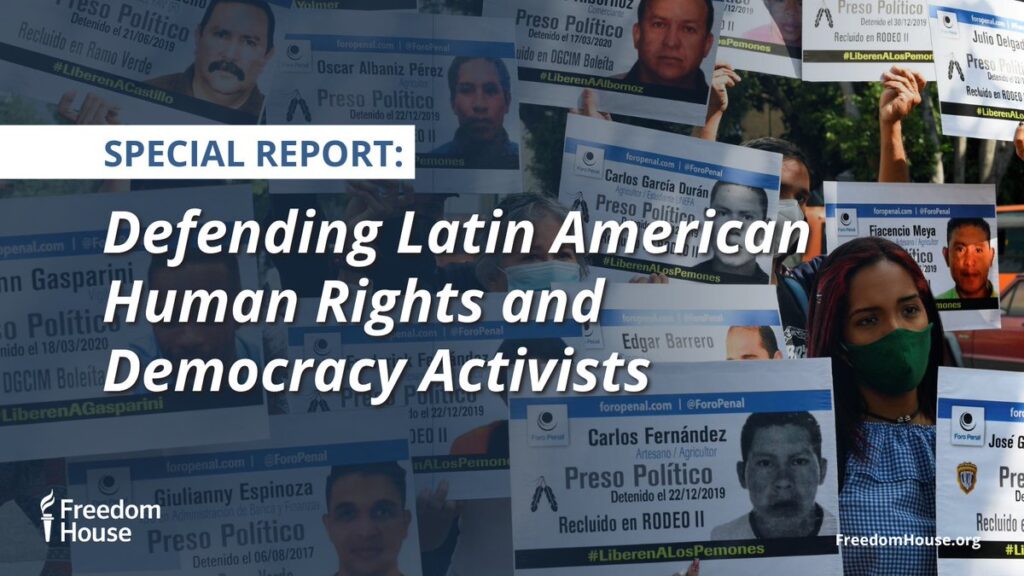 Latin America is one of the world’s most dangerous regions for human rights defenders, accounting for more than three-quarters of all murders of activists in 2020, according to a new report from Freedom House. The COVID-19 pandemic has only made things worse, say the authors of Defending Latin American Human Rights and Democracy Activists.
Latin America is one of the world’s most dangerous regions for human rights defenders, accounting for more than three-quarters of all murders of activists in 2020, according to a new report from Freedom House. The COVID-19 pandemic has only made things worse, say the authors of Defending Latin American Human Rights and Democracy Activists.
The report is the first by Freedom House that focuses exclusively on human rights defenders and civil society organizations that promote rights and freedoms, NBC reports. Human rights defenders include community leaders and artists, some of them Indigenous leaders seeking to advance social justice and human rights. It found these defenders are working in increasingly hostile environments, facing intimidation, harassment, physical attacks, and legislation that criminalizes their work.
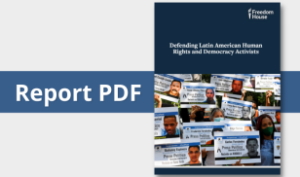 “Being a journalist, being a women’s rights defender, or being a human rights defender in Latin America is very dangerous,” said Gerardo Berthin, vice president of international programs at Freedom House.
“Being a journalist, being a women’s rights defender, or being a human rights defender in Latin America is very dangerous,” said Gerardo Berthin, vice president of international programs at Freedom House.
“This is a seminal study that lays the foundation for further areas of inquiry and analysis,” she added, noting that the report “identifies the main needs of vulnerable activists and human rights defenders in Latin America and highlights major issues that merit regional and national attention.”
In response to the threats, international protection organizations have implemented good practices pertaining to protection and security in general, aided by the expansion of internet access. This has enabled enhanced connection and communication with civil society organizations on the ground, including continuous and more systematic meetings and planning for effective protection, adds the report – funded by the National Endowment for Democracy (NED).
Political turmoil and deteriorating human rights have promoted unprecedented levels of migration, including an estimated 5.6 million Venezuelans, the largest migration in recent Latin American history. Tens of thousands Nicaraguans fled to neighboring Costa Rica after a violent crackdown on regime critics in 2018 and the arrests of opposition leaders activists ahead of the 2021 elections.
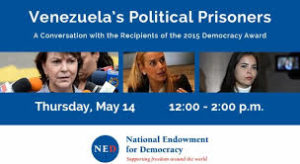 “A new phenomenon has emerged, which is human rights defenders in exile,” said Berthin. “And this is what you see in the two case studies of the Venezuelan human rights defenders moving to Colombia and Nicaraguan human rights defenders moving into Costa Rica.”
“A new phenomenon has emerged, which is human rights defenders in exile,” said Berthin. “And this is what you see in the two case studies of the Venezuelan human rights defenders moving to Colombia and Nicaraguan human rights defenders moving into Costa Rica.”
“Even though some of these exiles cross the border into Colombia and Costa Rica — safer places — you still have the chance of potential transnational repression coming from the authoritarian regimes in their home countries,” she added.
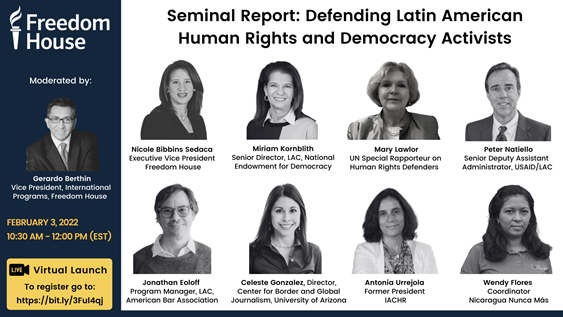
Freedom House VP Berthin hosted a webinar to launch the report, featuring Opening Remarks by Nicole Bibbins Sedaca, Executive Vice President, Freedom House; Miriam Kornblith, Senior Director, Latin America and the Caribbean, National Endowment for Democracy (NED); Mary Lawlor, UN Special Rapporteur on Human Rights Defenders; and Peter Natiello, Senior Deputy Assistant Administrator, USAID Latin America and the Caribbean Bureau. And a Panel of Experts, comprising Jonathan Eoloff, Program Manager, Latin America and the Caribbean, American Bar Association; Dr. Celeste Gonzalez Bustamante, Director, Center for Border and Global Journalism, University of Arizona; and Wendy Flores, Nicaragua Nunca Más.
The report also offers an analysis of the effectiveness of assistance for Latin American HRDs. Findings include:
- Short-term assistance is most effective: Temporary relocation initiatives are more effective in the short term than in the long term because they respond to an immediate urgent threat with a limited investment to resources. Relocation initiatives and support are difficult to sustain in the long term, as the number of cases of threats and attacks against HRDS continues to rise sharply, taxing existing services, which must prioritize immediate, short-term responses. Most internal and external relocation initiatives last three to six months. While some include reassessment after 6 months, and some HRDs get protection measures for more than two years, most do not include long-term plans.
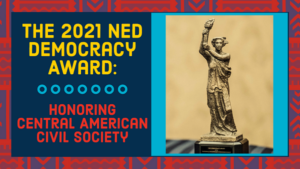 Locally-driven relocation initiatives or those where local CSOs coordinate closely with other temporary relocation initiatives, are the most effective in providing HRDs with emergency funds, resources and relocation support.
Locally-driven relocation initiatives or those where local CSOs coordinate closely with other temporary relocation initiatives, are the most effective in providing HRDs with emergency funds, resources and relocation support.- Pre-relocation contextual analyses contribute to more appropriate protection measures that address actual risks, and are viable in each specific context.
- Civil society participation in assistance: In countries that have a State-run protection mechanism, CSOs report that some governments have failed to include or incorporate the participation of civil society or lack adequate conditions for CSO participation. This has resulted in lack of communication between CSOs and State authorities.
- Legal assistance and representation to help HRDs counter the State’s criminalization of their work is crucial to allowing them to continue their work either in their home country or from abroad. These legal processes can often take years. Legal support is needed for the HRD who faces false charges or imprisonment.
- CSO capacity building. Larger, more prominent organizations working on protection often need the support of local organizations that can refer cases or connect smaller, nascent CSOs to assistance. When local CSOs have stronger tools and mechanisms to share information and accompany at-risk HRDs, assistance, including relocation can be more successful.







